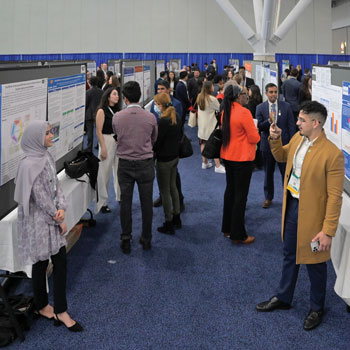ACP abstract competitions offer chances to learn, network
The first authors of top-scoring abstracts in each category in the podium competition are invited to give oral presentations at Internal Medicine Meeting 2025; the finalists in the poster competition are invited to compete on site.
The next Internal Medicine Meeting may be six months away, but it's not too soon for early career physicians to start preparing. ACP's National Abstract Competitions will begin accepting submissions this month and have a category specifically for physicians within 16 years of medical school graduation.
“Some folks might think, ‘Why am I still submitting abstracts as an early career physician versus a resident or a fellow or a medical student?’” said Tracey L. Henry, MD, MPH, MS, FACP. “To be promoted in academic medicine, you need to have a national presence. … It's also a way to just get your work out and tell everybody about what you're doing.”

Dr. Henry noted that ACP's abstract categories include Basic Research, Quality Improvement-Patient Safety, High Value Care, Physician Well-being and Professional Fulfillment, and Clinical Vignette. “It's not just traditional research … it's pretty much anything that we could be working on that we consider scholarly,” said Dr. Henry, who is an associate professor in the department of medicine at Emory University in Atlanta.
The abstract submission portal will open on or around Oct. 1, and physicians submitting abstracts have the option to specify a preference to compete in the podium competition or the poster competition. Winners are notified in early February. The first authors of top-scoring abstracts in each category in the podium competition are invited to give oral presentations at Internal Medicine Meeting 2025; the finalists in the poster competition are invited to compete on site. Internal Medicine Meeting 2025 takes place in New Orleans from April 3 to 5.
Dr. Henry, who won the podium competition in the Clinical Research category for early career physicians in Boston in 2024, said her favorite part of presenting at the meeting is the networking it offers, including chances to collaborate on peer-reviewed papers, present grand rounds, be a visiting professor, or even find a new job.
“A lot of what we do in medicine is all about exposure, and so having an abstract gives you that exposure,” she said. “Leaders are coming by, judges are reviewing the posters, and they say, ‘Oh, I'm really interested in what you're doing,’ and invite you to other opportunities.”
ACP Member Alissa Zeglin, MD, a podium winner in the Quality Improvement-Patient Safety category for early career physicians in San Diego in 2023, also said the competitions can open some professional doors. “As an early career physician, things are not always as clear in terms of how to get involved,” said Dr. Zeglin, who is a med-peds faculty member at Froedtert and the Medical College of Wisconsin in Milwaukee. “[The competitions] provide an opportunity to show your institution how this continued work can be beneficial and can help get you involved with more things.”
For Patrick Bagley, DO, FACP, the competitions helped ease his sense of professional isolation. As a Navy physician, he said, he was often the only doctor assigned to a particular geographic area. “You would have really no colleagues to bounce things off of, so for medical management, it was difficult because you had very few resources or people to discuss. But then for early career physicians, it was tough because you didn't have a chance to enjoy camaraderie,” he said. “Entering a conference and seeing people in different stages of their early career positions was just really, really awesome.”
One important feature of the competitions is the opportunity for audience members and judges to ask the presenters questions. Dr. Zeglin said the Q&A allowed her to get additional sets of eyes on her project and learn what specific aspects were most interesting or useful to other physicians. “It's all the same evidence-based medicine, but there's differences in practicing patterns or the way that institutions do things, so that experience is always very helpful,” she said.
Even when the Q&A session is intimidating, it's constructive, said Dr. Bagley, who is an internal medicine physician in Portland, Maine. His abstract, a podium winner in the Physician Well-being and Professional Fulfillment category for early career physicians in Boston, examined gender representation in three popular internal medicine podcasts, assessing the prevalence of women hosts and guests as well as their word counts during podcast episodes.
To Dr. Bagley's surprise, a creator of a podcast he and his colleagues didn't include attended his presentation and asked him why.
“I was a little caught off guard, because I had never listened to their podcast … I was a little scared, because I didn't have a great answer, but on the other hand, I was very pleased that people were saying, ‘This was valuable stuff you're doing. You should broaden your scope,’” he said. “That was my favorite part, seeing people engaged, asking tough questions, and thinking about the ideas that I was sending their way.”
Early career physicians can also serve as judges for the Medical Student and Resident/Fellow abstract competitions and presentations. Dr. Henry, who has both judged and competed, estimates that judging can take two or three hours of an early career physician's time.
“You don't necessarily have to be in academic medicine to be a judge,” she said. “I think it's great when people from all different practice types and practice styles who attend the meeting and just want to kind of see what's out there [volunteer]. … It's a form of meeting new students and residents who are doing a lot of awesome work. It's a form of service. It's a form of giving back.”
Dr. Bagley, who was a moderator for the ACP Resident/Fellow Members' abstract presentations in Boston earlier this year, called involvement in the abstract competitions invaluable for early career physicians.
“A lot of medicine is routine work, but I think the joy comes from challenging topics, interesting things to think about, and there's probably no better place to think about cool stuff than at a conference like ACP,” he said. “It helps us find the joy in medicine, as opposed to just the labor or the employment aspects of being a doctor.”



